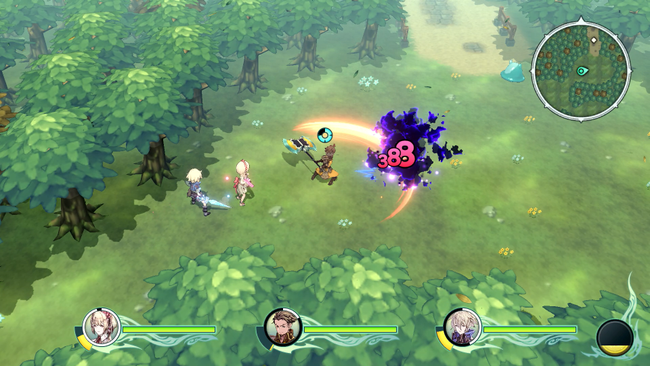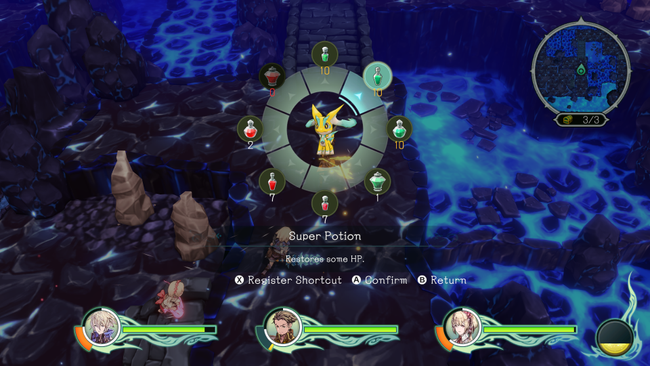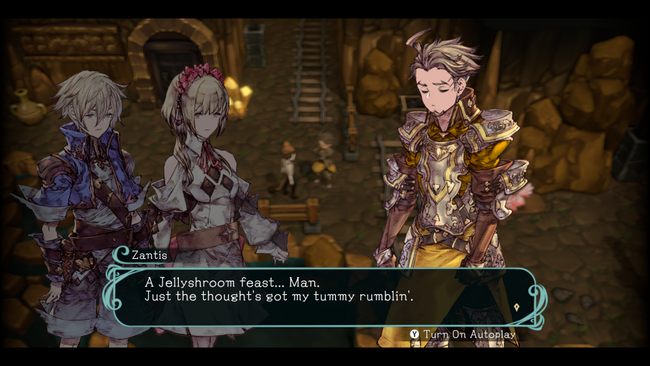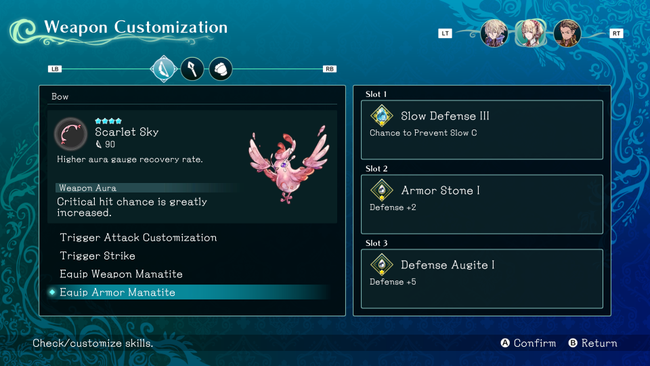
Trinity Trigger Review
If you are a regular player of niche games, you may be familiar with FuRyu, a publisher of JRPGs that often touts the involvement of splashy key creators from beloved series of yesteryear. They often like to evoke nostalgia with new projects that emulate — at least to some degree — classic RPGs and franchises. Whether it's Shin Megami Tensei and Monark, or Persona 2 & The Caligula Effect, FuRyu's apparent philosophy has so far resulted in mixed results at best.
This time around, the game in question is Trinity Trigger, which is undoubtedly trying to appeal to fans of Square Enix's Mana series, Secret of Mana in particular. Setting out into the very first starting town, the soundtrack from Hiroki Kikuta readily evokes SFC-era Mana titles, and the similarities don't stop there.
If you've played Secret of Mana or the original Trials of Mana (Seiken Densetsu 3), then you broadly already have an idea of what Trinity Trigger plays like. With top-down real-time combat, familiar aesthetics, ring-shaped menus, and eight different weapon types that can be switched on the fly, the inspiration is more-than-obvious. I half-expected the shop tenant to be a dancing man in a turban.

Trinity Trigger feels like a long-lost Nintendo 3DS game in some ways, with very simple-but-stylized character models, and basic-but-charming world environments. Although the games were developed by different studios, in some ways, Trinity Trigger reminds me of The Alliance Alive, only that game borrowed elements from the SaGa series instead of Mana.
Shortly into the game, you'll eventually have three playable characters — Cyan, Elise, and Zantis — each of whom can eventually wield all eight weapon types. There are some minor differences in weapon affinity and order obtained, but generally speaking, the three characters each play identically. You control one of your choosing, while the other two will act autonomously in your stead, and you can switch which character you are controlling at the click of a button.
There is one key clarification I have to make regarding this review. I played Trinity Trigger as a single-player RPG, and I am evaluating it as such, which is reflected in my score at the bottom of this article. However, the game also supports local co-op for up to three players. From my experience in playing the game solo, if you are interested in Trinity Trigger, I suggest that you consider trying to find someone to play with, if possible.
As a solo adventure, Trinity Trigger struggles in a few aggravating and miserable ways. Most notably, the AI behavior for your game-controlled comrades is dimwitted, to put it lightly. Your trailing two companions will often run into environmental hazards like spikes and poison goo, and you can bet they would much rather take multiple punches to the face than even attempt to dodge out of the way.

If I ever found myself struggling in the game, it was practically always because the computer-controlled allies kept finding ways to hurt themselves. One place this behavior comes to a head is in the final boss fight, actually, in which your final foe often leaves damage zones behind their movements. Once again, your allies just seem to love to continually run directly into these.
But there are other annoyances stemming from the game's multiplayer-centric design, too. For instance, every enemy in Trinity Trigger is more susceptible to certain weapon types than others. The game is pretty clear in telling you when foes are taking effective or non-effective damage, so you - the player - can swap to better weapons whenever you need to. If anything, weapon-switching is the central mechanic of the game.
Your allies, however, will never switch weapons on their own. They'll simply continue to attack with whatever weapon they have equipped, even if they are doing pathetic damage with an ineffective weapon. They will never use their weapon's special abilities, either. This means that — to play most effectively — you will constantly need to toggle between all three characters simultaneously and switch their weapons for the various enemy types you fight.
This seems to be the intended design of the game, to use the weapon-wheel to react accordingly and switch to effective weapons, but it's this ultimately makes playing Trinity Trigger a mess of neverending stop-start menuing to manage your party's weapons and items in real-time. I was never a huge fan of Secret of Mana's ring menu reliance either, but Trinity Trigger manages to exacerbate this annoyance, because now you have three characters to manage simultaneously at all times.
I have no doubt that Trinity Trigger is more fun when played as a cooperative multiplayer game, in which strange AI annoyances can be mitigated by having thoughtful human players, let alone simply enjoying an adventure RPG with friends. However, I suppose you'd simply have multiple players pausing the action with the ring-menu now, instead of just yourself. It's also worth noting that the multiplayer functionality is local-only, not online.

Otherwise, the flow and narrative of Trinity Trigger are mostly standard fare. You'll go through fields and dungeon areas, fighting enemies in real-time, collecting money and items. The sidequest design in Trinity Trigger is somewhat respectable, often comprised of little detours to battle new foes or optional bosses, and sometimes even open up new locations in previously-visited areas. The main plotline itself is mostly unremarkable, nothing captivating but not laughable either.
There is one more notable mechanic in Trinity Trigger to mention, and that's the Manatite system. Basically, Manatite are runes that you can attach to your weapons. You can do three offensive and three defensive runes per weapon, per character. That means you can eventually have a total of 144 rune slots to mess with at total, which is a little overwhelming. Manatite are created by various resources you'll constantly find by defeating enemies and doing quests.
Overall, I found this system largely tedious because of how runes are only effective for the single weapon they are equipped to, not for the character. You obviously don't need to outfit every weapon for every character, but to manage even half or even a third of the total Manatite slots is a dreary exercise in micromanagement. If you spend valuable resources to create an Attack +30% rune, which is obviously quite valuable, it only is effective for one of the eight weapons equipped to your character.
Let's say you place that rare Attack + 30% rune on your bow-type weapon. That means your 7 other weapons will always feel underpowered in comparison, but you'll still want to swap to those when you face enemies weak to those non-bow weapon types. So, what do you do?
What I ended up doing was not only switching weapon types frequently during battle, but also often swapping my best runes to my currently equipped weapon, constantly. This makes the weapon toggling even more of a chore, and again, you could doing this quite frequently, at the very least for each new zone you enter.
The options are to simply deal with it and only have your best Manatite runes on a few weapons, spend more time grinding resources to make more runes so you can more evenly outfit your eight weapons per character, or do what I did and swap runes around regularly. It's a lose-lose-lose situation. There aren't even any auto-equip options to make managing this easier.

Trinity Trigger's most admirable aspects are easily its character art by Raita Kazama and parts of Kikuta's soundtrack. Other components just aren't compelling for some reason or another. The combat is functional but simple, the equipment system is overwrought, several dungeons feel copy-pasted, and the narrative isn't strong enough to mitigate the gameplay tedium.
I come away from Trinity Trigger largely apathetic. It's a simple game with some nostalgic charm, but irritating ally behavior, tedious weapon/rune systems, and a mundane plot make it an easy pass, especially as a single-player game. If you have a local friend to play with, Trinity Trigger may offer an easygoing 20-hour experience you can play together, but otherwise there's not much to latch onto here.